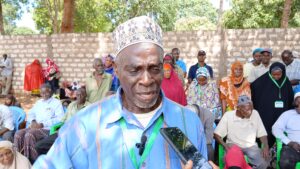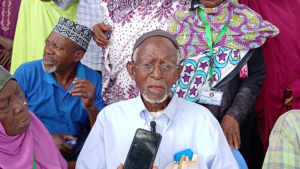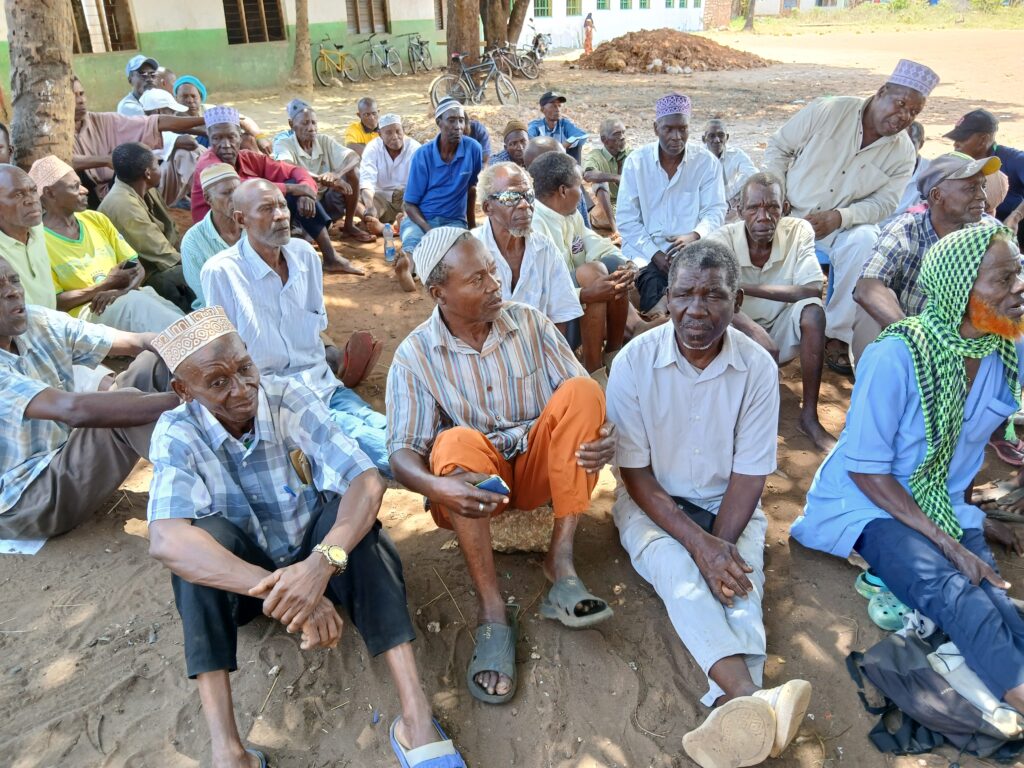BY SHABAN OMAR
A section of historical land injustice victims in Diani, Kwale County, is urging President William Ruto to prioritize addressing the long-standing issue of land grabbing in the coastal region.
The residents said that Ruto’s top priority during the upcoming Mashujaa Day celebrations, set to be held in the area, should focus on resolving land injustices that have plagued the region for years.
Led by Nasir Hassan Podo, the locals said that since the 1980s, indigenous communities have faced massive injustices as their ancestral lands have been grabbed by private developers and corrupt government officials.

A local Ramadhan Mwamatezo speaks in an interview at Mwamambi in Diani, Kwale County on Monday, October 7, 2024.
Podo said that the residents have endured years of intimidation, forced evictions, and demolitions, reducing them to the status of squatters on their own ancestral lands.
“Our stories are painful to share. We have been running back and forth, wrongfully arrested, jailed, and had our lands taken from us. Where is the justice?” Podo lamented.
The old man said that they can hardly distinguish between the colonial period and post-independence, as conditions continue to worsen with each passing day.
He expressed sorrow that, from their childhood until now, the majority of the local community still does not own land, a reflection of the deep-rooted land injustices they have faced.
Podo mentioned that one of the most affected areas is Chidze, known as Diani Complex land, which spans approximately 960 acres.
He said that the land has been grabbed by numerous individuals, leaving the local community with nothing.
According to Podo, the upcoming Mashujaa Day celebrations should serve as an opportunity for retribution and a chance to address land injustices, not only in Kwale but throughout the entire coastal region.
He urged President Ruto to prioritize delivering justice to the deprived coastal communities.
Rukia Mwadzihi said that they have nothing to be proud of, as all their ancestral lands have been taken by private developers.
Mwadzihi recounted how their ancestors struggled and eventually died from the stress caused by constant harassment and police brutality under previous governments.
“We witnessed our parents being beaten like animals, undressed in front of us, and jailed, yet the land grabbing continues unabated,” she said.
The elderly woman urged President Ruto to consider compensating the victims of land injustices and providing them with land to settle on.
She noted that many of their parents fought hard for independence and contributed to the country’s development, yet they have no place to call home.
Mwadzihi revealed that her family lost six acres of ancestral land to land grabbers, leaving them to live like homeless people.

“We had a vast, fertile piece of land in Chidze, full of crops, but it was all taken from us, and our homes were demolished,” she said.
She said that the most valuable gift President Ruto could offer the people of Kwale during the Mashujaa Day celebrations would be the return of their ancestral lands and an end to protracted land injustices.
Another local, Ramadhan Mwamatezo, said that many Kwale residents are yet to experience true independence, as their lives remain filled with hardship.
He said that they will only feel independent when their ancestral lands are returned to them, noting that the persistent land grabbing has contributed to their poverty and poor living conditions.
Mwamatezo added that they are unable to focus on development, as they are constantly engaged in ongoing battles with land grabbers.
Mwanamis Mwachanyuma said that the locals feel they have no one to fight for their rights and that President Ruto is their last hope.
She shared that the community felt relieved when the Kenya Kwanza government pledged to address land injustices in the coastal region.
Mwachanyuma urged the president to fulfil the promises made during his campaigns so that the residents could live freely and happily.
She noted that Kwale residents are generally friendly and peaceful; however, they face challenges as non-locals exploit loopholes to deprive them of their ancestral land rights and unlawfully take their land.
Mwachanyuma said that indigenous people do not own land, while individuals from other parts of the country possess title deeds for the land that rightfully belongs to the local community.
Juma Mwatamu stated that land injustices have been the primary issue for the coastal people.
He said that individuals are taking advantage of their friendliness and warm hospitality to exploit them further.
Mwatamu said they will keep on fighting until justice is served.
He said they have been patient enough and now it is time for communities to get back their ancestral lands.


